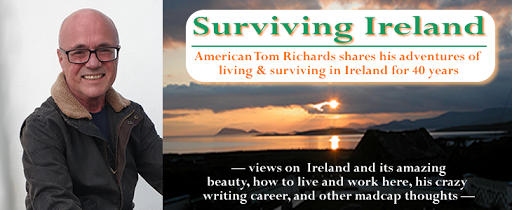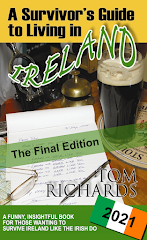Recently I received a post from an American family who are considering a move to Ireland. They referred to an older 2009 post on this Blog that addressed (at least in part) what it's like to move to the Dublin area, where to live, what might be found there, and similar nuggets of wild fact.
Of course I can't find the post. So...I thought I'd address this area again and bring things up to date. And as usual, I have Good News and Bad News. But first...
The Good News: Such a Choice!
Dublin is by far Ireland's largest city. Almost a third of the citizenry now live in Dublin and its general environs. They do so for good reasons: most of the jobs are in the Dublin area. Following extensive investment, Dublin is - in general - a delightful place in which to live with high speed broadband, great access to the rest of the country and abroad via rail, bus, airplane and ferry, a heck of a lot do to - from theatre to museums, the Dublin Zoo to great walks through the Temple Bar area; from outstanding (though somewhat expensive) shopping and fine eateries, and a quick drive to the seashore or south to County Wicklow and its wonderfully extensive parks, waterfalls, and lakes - the area is a draw to both residents and visitors alike.
But if you're considering a move to the Dublin area take a look at the many options:
The City Centre - city living isn't for everyone but if you're determined to live like an Urban King then living in Dublin City Centre could be just your thing. Compared to many capitol cities in the world, Dublin has a rather small footprint, making much of it accessible by foot-power or bike. And you'll always find something fun to do. Take a walk up Grafton Street, the heart of city shopping, and spend your way to penury at the many shops while being comforted by the wild and wonderful buskers that line the street. Visit Bewleys for a cup of tea. Stroll along the Liffey River and people watch: tense business folks marching to their next meeting; young couples arm in arm taking a coffee in sheltered spots along the River making doe-eyes at each other; lawyers running into things with the next case in mind as they make their way to the Law Courts. Take in the National History Museum (it's still free at least for now), or walk up to the Dail - Ireland's seat of government and mad politicians - to express your views.
The Phoenix Park is also within walking distance (though a relatively long walk). As the largest city park in Europe, it is also home to the Irish president, the US Ambassador, and Dublin Zoo (not that I'm saying the president and Ambassador are monkeys - not at all, at all! The president in particular is one nice fella and someone that most are immensely proud of). Got a thirst in your mouth? Then have a cuppa either in the Zoo or at the wonderful Victorian Tea Rooms. And if that doesn't work stroll back into town for a pint at any number of local establishments. Hungry? Then walk into Temple Bar. Years ago when I first moved here the area (located right along the Liffey) was a run-down series of destitute warehouses. Today, it is a walking puzzle containing any number of fine restaurants and shops. But if you're not city-minded (yet still have to live near the city) where else might you consider?
Fortunately, the Dublin Area - including counties Dublin, Wicklow, Meath, and Louth - offer a wide range of options.
County Dublin - where to start? Try the town of Skerries just north of Dublin Airport. Or how about Portmarnack? Or Malahide? Or Howth? All of these communities offer quick access to the coast and many beaches; lovely tidy communities with restaurants and pubs; wonderful people and good schools... what's not to like? Or want to go to the south side of the city? Then why not Dun Laoghrie with its many stores and fine eateries.
Or County Wicklow - to the south of County Dublin is the Garden County named as such for good reason. Even though you may be only miles from the City Centre, you could be visiting an area known for its steep hills, dense forests, and exotic plants. If a visitor, make sure you go to Powerscourt and its waterfall and Glendalough and its outstanding vistas and lakes, and home to a 6th Century monastic 'city'. Want to live in Wicklow? Then try Bray, a delightful little town right on the coast.
Counties Meath and Louth - or perhaps you'd like to go north. These counties offer so very much! Louth, abutting the Irish Sea, has many communities that could be of interest. Drogheda, the county seat, is a larger urban area full of good shopping, restaurants, and right on the sea with good walks and quick access into Dublin. Or perhaps Bettystown, a smaller coastal village with its pretty church backing right up to the water. And take a look at County Meath. Navan, home to the largest Zinc mine in Europe (or perhaps the world) is a bustling community. I lived there for years. Its shopping centre, local shops, and wide range of pubs and restaurants provides a wide choice. Walk along the River Boyne and take in some fresh air or get a license and throw your cast in for some of Ireland's best salmon fishing. Go 8 miles west and you're in Trim, a handsome smaller town with one of the oldest castles in all of Ireland (Mel Gibson visited when Braveheart was shot there), and take a delightful stroll again along the River Boyne, ending up at some of Ireland's best pubs.
I've only covered a few options above. But explore Ireland for yourself perhaps by Googling county maps, choosing an interesting sounding town name, and researching further. But now for...
The Bad News
Housing - whether renting or purchasing - is becoming increasingly expensive. Let me rephrase that: prices are rocketing skyward, particularly in Dublin and its commuter belt including many of the counties mentioned above. Why? The answer is, in part, simple. First, the country is finally coming out of recession. More jobs mean more money in people's pockets. Which in turn drives the pent-up demand as families who couldn't afford to buy seek to do so. Renting is just as bad: prices for a Dublin city apartment have gone nuts (see
www.daft.ie for more information). The other factor is supply: during the recession few new houses and apartments were built. And it's going to take awhile for the construction industry - decimated during the past few years - to regain traction and meet the upward surge in demand.
Only recently, the Central Bank has passed new regulations regarding down payment requirements when purchasing. Prior to the recession, banks were lending purchasers 100 percent mortgages - or more. But it was announced only yesterday that now, first time buyers must come up with 10 percent of the purchase price up to just over 200,000 euro, with a sliding scale in excess of that. Other buyers must come up with 20 percent of the purchase price. Add to that down payment outlays for solicitors, stamp duty, and other costs, and depending on the house price, it's a hefty amount.
These new regulations could result in a number of changes: ever-rising home prices could cool a bit as demand is dampened. Which is good news for those with cash in their wallets who want to buy soon. But bad news of course for those who want to buy and simply can't come up with the bag full of cash they'll need to satisfy the new regulations.
Such is Ireland, as with many other places: good news and bad. But on the whole, the economy is a heck of a lot better than it has been since 2007 and the creeping disaster of recession that hurt so very many. If you're truly consider a move (or visit) to the greater Dublin area my advice is to take your time and hunt wisely.
A Survivor's Guide to Living in Ireland 2015 Kindle Edition Now Available!If this blog interests you, then you might want to know more about living and working in Ireland. Are you thinking of traveling to Ireland, moving to Ireland, working in Ireland? Do you want to understand what makes the Irish tick, how you can get a job here, and how to survive in this wonderful country? If so, consider purchasing the 2015 Kindle edition of A Survivor's Guide to Living in Ireland. Over 11,000 have already done so! Now over 85,000 words long, this book could make the perfect gift for those interested in this wonderful country. Simply click on any of the above links to purchase the new 2015 Kindle edition. You can also download free apps to read the Kindle version on any PC or Mac.
 Ireland's Newgrange Monument Welcomes Winter Solstice
Ireland's Newgrange Monument Welcomes Winter Solstice


